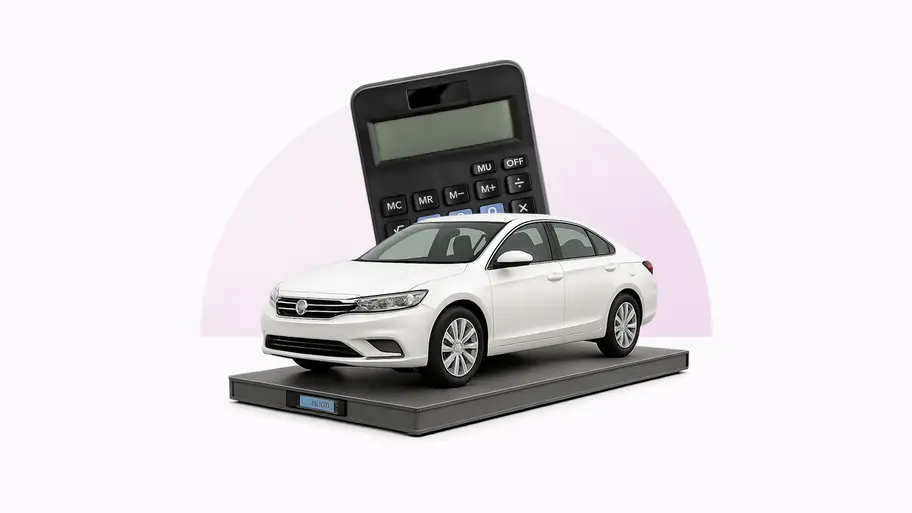Powered by Coverage.com (NPN: 19966249)
Coverage.com, LLC is a licensed insurance producer (NPN: 19966249). Coverage.com services are only available in states where it is licensed. Coverage.com may not offer insurance coverage in all states or scenarios. All insurance products are governed by the terms in the applicable insurance policy, and all related decisions (such as approval for coverage, premiums, commissions and fees) and policy obligations are the sole responsibility of the underwriting insurer. The information on this site does not modify any insurance policy terms in any way.
Best car insurance in New Jersey for 2026

Powered by Coverage.com (NPN: 19966249)
Coverage.com, LLC is a licensed insurance producer (NPN: 19966249). Coverage.com services are only available in states where it is licensed. Coverage.com may not offer insurance coverage in all states or scenarios. All insurance products are governed by the terms in the applicable insurance policy, and all related decisions (such as approval for coverage, premiums, commissions and fees) and policy obligations are the sole responsibility of the underwriting insurer. The information on this site does not modify any insurance policy terms in any way.
Best car insurance companies in New Jersey
The average cost of car insurance in New Jersey is $271 per month for full coverage, according to Quadrant Information Services. Minimum coverage for New Jersey drivers averages $118 per month. However, rates vary between carriers, as well as benefits, coverage selections and customer service. These carriers are a good starting point for drivers looking for the best car insurance companies in New Jersey.
Bankrate Score
Avg. monthly premium
Full coverage
Avg. monthly premium
Min. coverage
Why Geico made our list: Geico offers one of the most extensive lists of discounts in the industry, with potential savings for federal employees, military members, safe drivers and good students. The company’s DriveEasy telematics program can help drivers earn even more discounts based on their driving habits, and these savings can often be stacked for greater money-saving opportunities.
| Bankrate Score | 4.3 |
| J.D. Power | 643/1,000 |
| AM Best Rating | A++ |
Geico standout features
- DriveEasy telematics
- Low average rates
- Potential coverage options for high-risk drivers
Bankrate Score
Avg. monthly premium
Full coverage
Avg. monthly premium
Min. coverage
Why State Farm made our list: With Steer Clear and good student discounts, State Farm may be a good choice for younger drivers in New Jersey. It also may appeal to those who want to work with a live agent — State Farm sells its coverage through a network of local exclusive agents, and there are plenty of agencies in the state. In fact, State Farm is the largest insurance company in the country by market share.
| Bankrate Score | 4.3 |
| J.D. Power | 673/1,000 |
| AM Best Rating | A++ |
State Farm standout features
- Steer Clear teen driving program
- Drive Safe & Save telematics program
- Young driver training discount
- Rideshare driver coverage available

Bankrate Score
Avg. monthly premium
Full coverage
Avg. monthly premium
Min. coverage
Why NJM made our list: New Jersey Manufacturers (NJM) is a regional insurer based in West Trenton, New Jersey. Although NJM is a smaller insurance company, it may provide more personalized service and a strong understanding of local drivers' needs.
| Bankrate Score | 4.2 |
| J.D. Power | 721/1,000 |
| AM Best Rating | A+ |
NJM standout features
- Defensive driving discount
- Limited pet injury coverage available
- Trailer/camper body coverage included
- TNC rideshare coverage available

Bankrate Score
Avg. monthly premium
Full coverage
Avg. monthly premium
Min. coverage
Why Travelers made our list: Travelers offers home, condo and renters insurance, which means there’s an opportunity to bundle and save on your policies. Travelers has several auto insurance discounts that are less common in the industry, including savings for electric and hybrid vehicles.
| Bankrate Score | 4.1 |
| J.D. Power | 633/1,000 |
| AM Best Rating | A++ |
Travelers standout features
- Bundling discounts
- Hybrid/electric vehicle discount
- IntelliDrive telematics program
- Affinity program savings and benefits

Bankrate Score
Avg. monthly premium
Full coverage
Avg. monthly premium
Min. coverage
Why Selective made our list: Selective is a regional insurer based in Branchville, New Jersey. Along with better-known perks like accident forgiveness and vanishing deductible, it also offers unique add-ons like agreed value and pet injury coverage.
| Bankrate Score | 3.9 |
| J.D. Power | |
| AM Best Rating | A+ |
Selective standout features
- Diminishing deductible
- OEM parts coverage available
- Agreed value coverage
The Bankrate Promise
Read our full methodologyAt Bankrate, we strive to help you make smarter financial decisions. While we adhere to strict , this post may contain references to products from our partners. Here's an explanation of . Our content is backed by Coverage.com LLC, a licensed entity (NPN: 19966249). For more information, please see our
78
years of industry experience
10
licensed staff
34.5K
ZIP codes examined
120
carriers reviewed
Powered by Coverage.com (NPN: 19966249)
Coverage.com, LLC is a licensed insurance producer (NPN: 19966249). Coverage.com services are only available in states where it is licensed. Coverage.com may not offer insurance coverage in all states or scenarios. All insurance products are governed by the terms in the applicable insurance policy, and all related decisions (such as approval for coverage, premiums, commissions and fees) and policy obligations are the sole responsibility of the underwriting insurer. The information on this site does not modify any insurance policy terms in any way.

Compare auto insurance rates
Powered by Coverage.com (NPN: 19966249)
Coverage.com, LLC is a licensed insurance producer (NPN: 19966249). Coverage.com services are only available in states where it is licensed. Coverage.com may not offer insurance coverage in all states or scenarios. All insurance products are governed by the terms in the applicable insurance policy, and all related decisions (such as approval for coverage, premiums, commissions and fees) and policy obligations are the sole responsibility of the underwriting insurer. The information on this site does not modify any insurance policy terms in any way.
How to find the best car insurance in New Jersey
Finding the best car insurance in New Jersey depends on your unique driving profile, since each insurer uses its own formula to set rates. Comparing quotes from at least three providers can help you identify the company that best fits your coverage needs and budget.
Learn more about New Jersey car insurance:
Frequently asked questions
Methodology
Rates
Bankrate utilizes Quadrant Information Services to analyze November 2025 rates for all ZIP codes and carriers in all 50 states and Washington, D.C. Rates are weighted based on the population density in each geographic region. Quoted rates for our base profile are based on the following characteristics and full coverage limits with bundling and paperless billing discounts applied:

Bodily injury liability
$100,000 per person$300,000 per accident
Property damage liability
$50,000 per accidentPersonal injury protection
$100,000 per accidentUninsured motorist bodily injury
$100,000 per person$300,000 per accident
Collision deductible
$500Comprehensive deductible
$500To determine minimum coverage limits, Bankrate used minimum coverage that meets each state’s requirements. These are sample rates and should only be used for comparative purposes. Your quotes will differ.
If otherwise specified, the base profile has been modified with the following driver characteristics:
Other profiles
Bankrate Score
Our Bankrate Score for auto insurance considers key variables that our insurance editorial team determined impact policyholders’ experiences with an insurance company. These factors include a robust assessment of each company’s cost of coverage, product availability, financial strength ratings, online capabilities and customer and claims support accessibility. We grouped these factors into three essential categories — cost and ratings, coverage and savings, and support — which we then weighted in a tiered approach.
Each category was assigned a metric to determine performance, and the weighted sum adds up to a company’s total Bankrate Score — out of 5 points. Our scoring model provides a comprehensive view, indicating when companies excel across several key areas and highlighting where they fall short.
- Tier 1 (Cost & ratings): To determine how well auto insurance companies satisfy these priorities, our team analyzed quoted premiums from Quadrant Information Services (if available), as well as any of the latest third-party agency ratings from J.D. Power, AM Best, Demotech and the National Association of Insurance Commissioners (NAIC).
- Tier 2 (Coverage & savings): We assessed companies’ coverage options and availability to help policyholders find a provider that balances cost with coverage. Additionally, we evaluated the discount options listed on each company’s website.
- Tier 3 (Support): To encompass the many ways an auto insurance company can support policyholders, we analyzed avenues of customer accessibility along with community support. This analysis incorporated additional financial strength ratings from S&P and Moody’s and factored in a company’s corporate sustainability efforts.
Tier scores are unweighted to show the company's true score in each category out of a possible five points.



